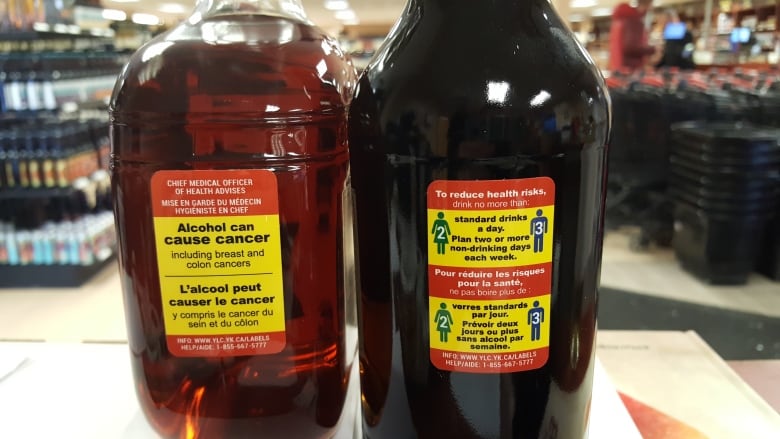Cancer warning labels on booze aren't coming back, Yukon says
Some labels will be used again, but not the ones mentioning cancer
Yukon's warning labels that drew a link between drinking and cancer risk are gone for good.
"Naturally, I'm disappointed," said Brendan Hanley, Yukon's chief medical officer of health, on Thursday.
The labels were introduced with a splash last November, as part of a Health Canada-funded research project. The Yukon government presented itself as a trailblazer, as cancer warning labels hadn't been affixed to booze before in Canada.
And, surprise — the liquor industry didn't like them.
Within weeks, the project was halted and the Yukon government began talks with industry representatives and the researchers leading the project.
-
Liquor industry calls halt to cancer warning labels on Yukon booze
-
Yukon seeks 'common ground' with liquor industry over warning labels
On Thursday, the territorial government said the research project would continue with two other warning labels that had also been introduced last fall. One offers suggested guidelines for low-risk drinking, the other shows a standard drink size.
The cancer stickers have been canned.

"This compromise was proposed by the researchers, as a way for us to continue," said John Streicker, Yukon's minister responsible for the Yukon Liquor Corporation.
Streicker said he's met with representatives from the industry groups, Beer Canada and Spirits Canada, but he doesn't know what they'll think of the revised project.
"I can't speak for them about how they will choose to respond," he said.
"I think the preference of the producers is to not have labels, period. And not to have a label study. I think I've heard that from them."
Other new labels will still be used
The researchers, based at the University of Victoria, want to determine what, if any, impact alcohol warning labels have on consumer attitudes and behaviours.
"The world has been watching, and I can feel a collective sigh of relief that the study now will continue, albeit in its modified form," Hanley said.
"If we can show a positive effect of these labels, we then can be able to make a much better case in the future for adding specific warning or advisory messages, such as the known causative effects of excess alcohol consumption, and the risk of cancer."
“The evidence has been growing for the past few years... <a href="https://twitter.com/hashtag/Yukon?src=hash&ref_src=twsrc%5Etfw">#Yukon</a>’s Dr. Brendan Hanley comments on the science linking alcohol and cancer. <a href="https://t.co/I0hGrPVcy8">pic.twitter.com/I0hGrPVcy8</a>
—@YukonPhilippeHanley also said the cancer labels weren't a total bust, as far as public health is concerned.
"The discussion that has gone on locally, around the country, and internationally over the last couple of months ... has certainly raised public awareness of this risk," he said.
"So in that way, we've already benefitted."
With files from Dave Croft